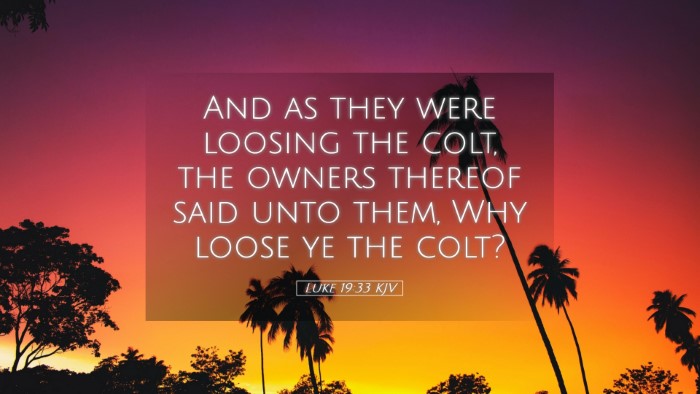Commentary on Luke 19:33
Verse Context: Luke 19:33 states, “And as they were loosening the colt, the owners thereof said unto them, Why loose ye the colt?” This verse is part of the account where Jesus sends His disciples to retrieve a colt for His triumphant entry into Jerusalem.
Introduction
This distinct moment in the Gospel of Luke’s narrative is pivotal, setting the stage for the final events leading to Jesus’ crucifixion and eventual resurrection. These events require carefully examining the text and its implications, especially from the perspectives offered by Matthew Henry, Albert Barnes, and Adam Clarke.
Exegesis and Theological Reflections
Historical Setting
Matthew Henry's Insights: Henry emphasizes the significance of Jesus' entry into Jerusalem on the colt, contrasting it with the expectations of a warrior king. Jesus, being a symbol of peace, chooses a humble animal. The question posed by the owners signifies the authority of Jesus and foreshadows both the divinity and humanity of Christ.
Albert Barnes' Reflection: According to Barnes, this act of sending the disciples to procure the colt demonstrates Jesus' foreknowledge and divine authority. The owners' query highlights societal norms; ownership is implicit in the question, yet Jesus is clearly above these social structures.
Adam Clarke's Contribution: Clarke elaborates on the significance of the colt's unbroken state, suggesting it symbolizes purity and readiness for divine purposes. The unexpected nature of this task reveals the broader theme of God's sovereignty over creation, including animals intended for sacred use.
Theological Themes
Divine Authority and Control
The inherent authority of Jesus is a predominant theme. The disciples acted under His command, illustrating His absolute power over all situations. Henry posits that the owners’ question was inevitable, serving to highlight Jesus' preeminence in all earthly matters.
Fulfillment of Prophecy
Barnes points out the fulfillment of Zechariah 9:9, where the king arrives on a colt. This moment is laden with prophecy, as it shows Jesus intentionally aligning His actions with God's plan of redemption, emphasizing His Messianic identity.
Humility and Peace
Clarke reflects on the humility of Jesus choosing a colt rather than a majestic steed, which would be more fitting for a conquering king. It foreshadows the nature of Jesus’ kingdom—marked not by temporal power, but by spiritual authority and peace.
Application for Modern Believers
Submission to Divine Will
This passage teaches that believers are called to respond to God’s instructions, often found in unexpected or seemingly mundane tasks. The act of securing the colt represents active faith and obedience, encouraging believers to trust and act upon God’s commands.
Recognition of Jesus’ Kingship
Understanding Jesus as a King who came in humility is crucial. It challenges believers to reassess their perceptions of power and authority in their lives and society—promoting a view of leadership anchored in servanthood and love rather than dominance and control.
Proclamation of Jesus’ Mission
Pastors and educators can use this narrative to highlight the importance of proclaiming the truth of Christ’s mission. Just as the disciples were sent to announce Jesus’ coming, modern believers are called to share the Good News in their communities, boldly yet humbly.
Conclusion
Luke 19:33 encapsulates a moment rich with theological weight and practical application. The insights from Henry, Barnes, and Clarke collectively remind us of Jesus' divine authority, fulfill prophetic promises, and emphasize the call to humility and obedience. This passage is a reminder for all believers to engage with Scripture intently, understanding both its immediate context and broader implications within the narrative of faith.


